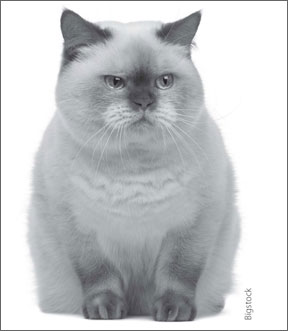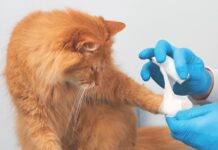Scent is one of the ways cats communicate, and their anal glands help in that effort. The pea-sized glands, or sacs, produce an odor that aids in establishing identity and territory. When a cat defecates, the scent glands empty through two ducts located at the 4 o’clock and 8 o’clock positions of the anal sphincter, the band of muscle encircling the anus.


288
“During defecation, the rectal musculature pushes the anal sac toward the stool in the rectum and squeezes out its contents — sort of like squeezing a tube of toothpaste at its bottom,” says dermatologist William H. Miller, VMD, medical director of the Companion Animal Hospital at the Cornell University College of Veterinary Medicine. This allows the cat to send the message “I was here” or “This is my place.”
Secretions Build Up. In most cases, a cat’s anal glands cause little problem, Dr. Miller says. They can, however, become impacted, inflamed or infected, usually because they’re not emptying normally. The thick, light gray to brown secretions build up in the sac. It’s thought that inflammation causes the opening of the anal sac duct to swell, plugging the duct.
In other cases, the stools may not exert enough pressure on the glands during defecation. Impacted anal glands can occur with chronically soft stools because the musculature has nothing to push the sac against. The same is true of cats with neurological disease. Cats with skin disease of the perianal region may also develop anal sac problems.
Inflamed or infected anal sacs are characterized by swelling and tenderness. To ease the discomfort, the cat may scoot on, lick or bite at his rear. If left untreated, inflamed or infected anal glands may abscess or even rupture. An abscess is a red or deep purple swelling, accompanied by fever, as well as scooting, licking and biting. An abscess that ruptures drains fluid through the break in the skin.
Overactive or impacted anal glands can be relieved by emptying or expressing the glands manually. Your cat’s veterinarian can express them or show you how to do it at home, but it’s a malodorous process that most people prefer to leave to the professionals.
Change in Diet. In the case of a cat with chronically soft stools, increasing the amount of fiber in the diet may help firm them. The veterinarian may recommend changing to a food with higher amounts of fiber. If a food allergy is causing soft stools or perianal itching, replacing the food with a hypoallergenic diet should help, Dr. Miller says.
Fiber supplements made for people or plain canned pumpkin are other ways to boost fiber. Ask the veterinarian about the type and amount to give.
If the sac is infected, topical antibiotics, with or without steroids and antifungal agents, are infused into the anal sac, Dr. Miller says. “In chronic or severe infections, oral medications may be given in conjunction with expressing the glands and the infusion of topical antibiotic.”
Overweight and sedentary cats may be more prone to anal gland infections. Weight loss and increased activity may help prevent a recurrence.
In the case of an anal sac abscess, treatment includes applying a warm compress and giving oral antibiotics. If the abscess ruptures, the veterinarian may have you flush the area daily with an antiseptic solution and apply warm compresses for a week or two until the swelling and infection resolve.
If your cat has chronic anal sac problems, consider having these vestigial scent glands removed surgically. There can be complications to this surgery so it should be done by a veterinarian who performs the surgery regularly. You and your cat will both be relieved.



